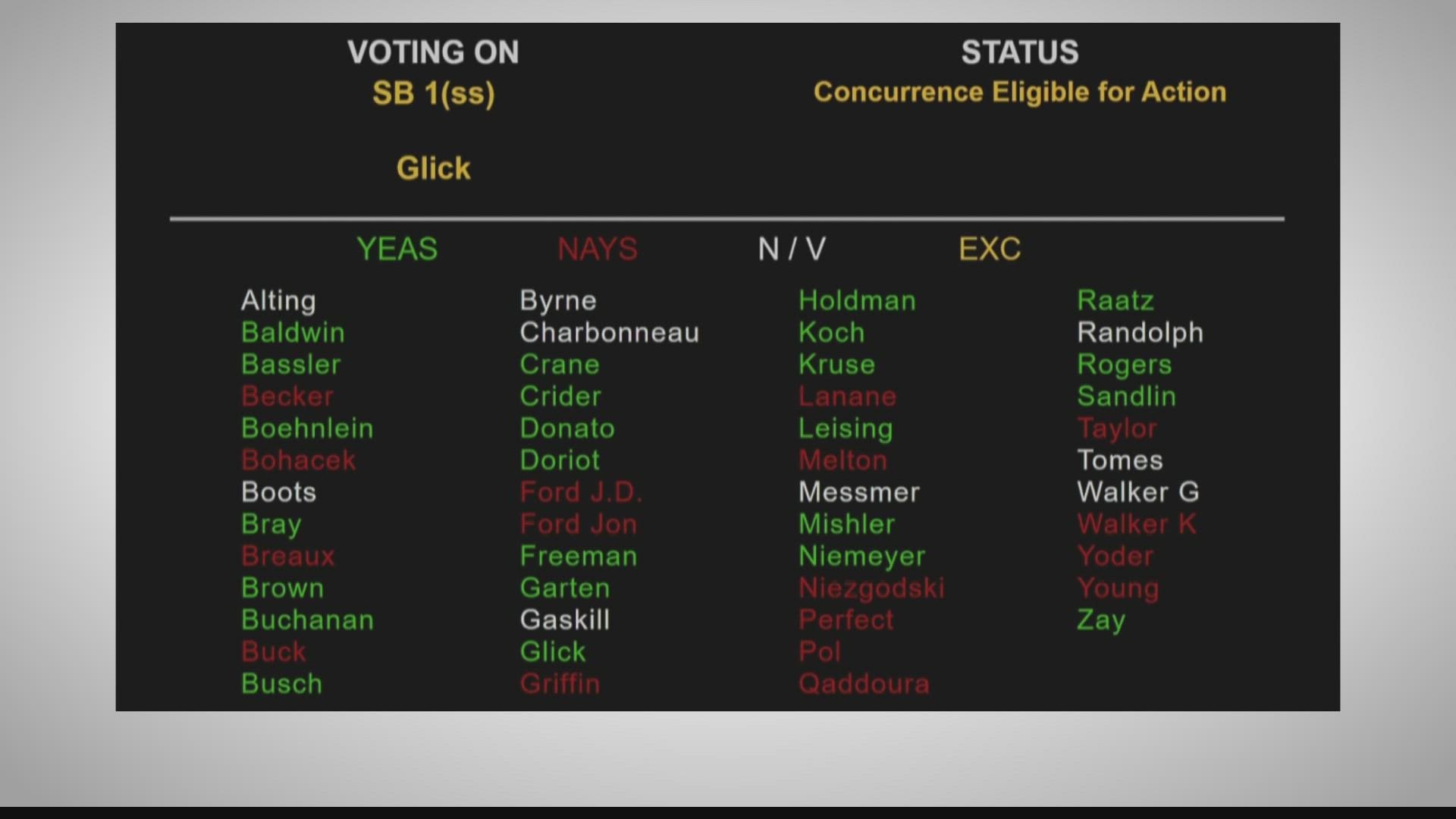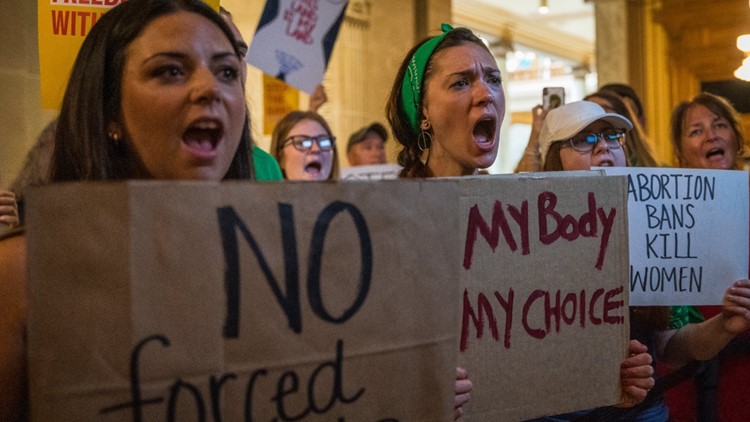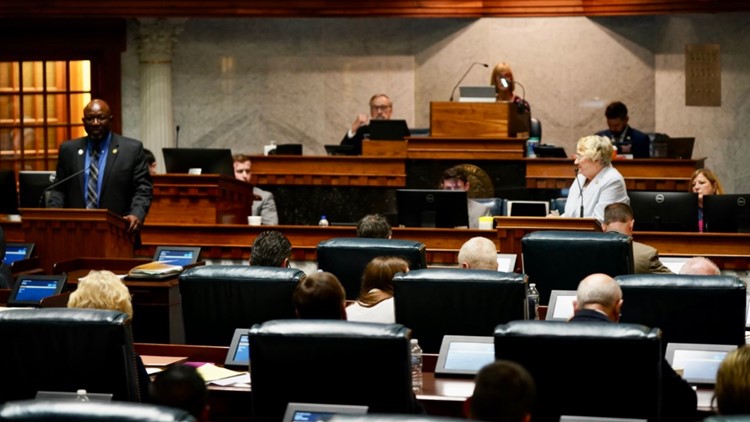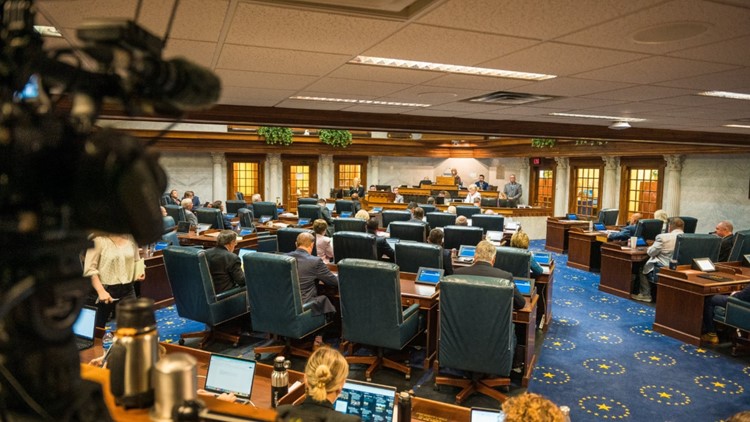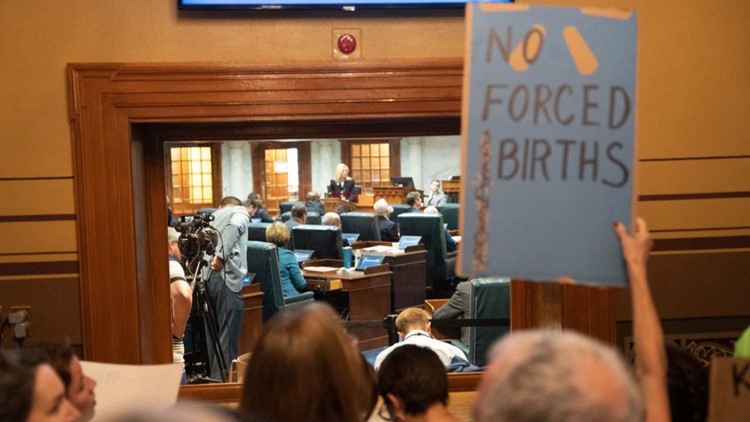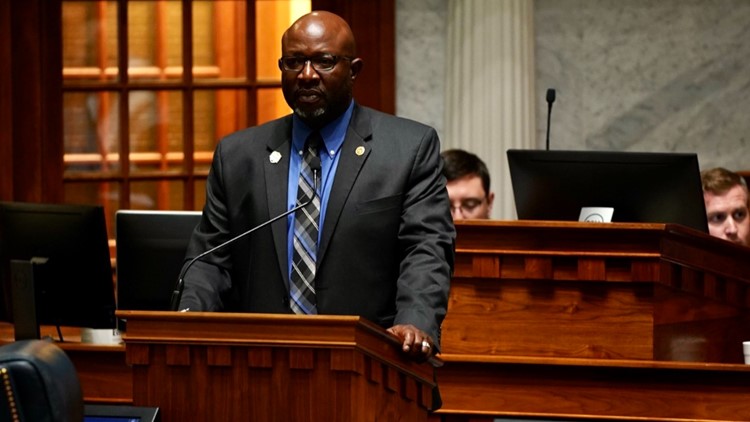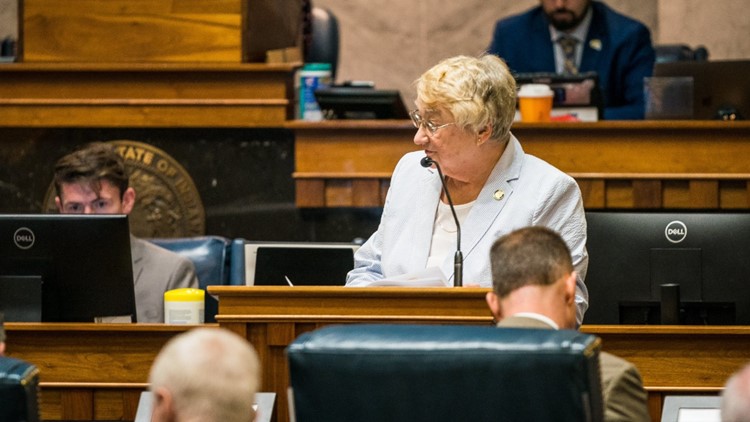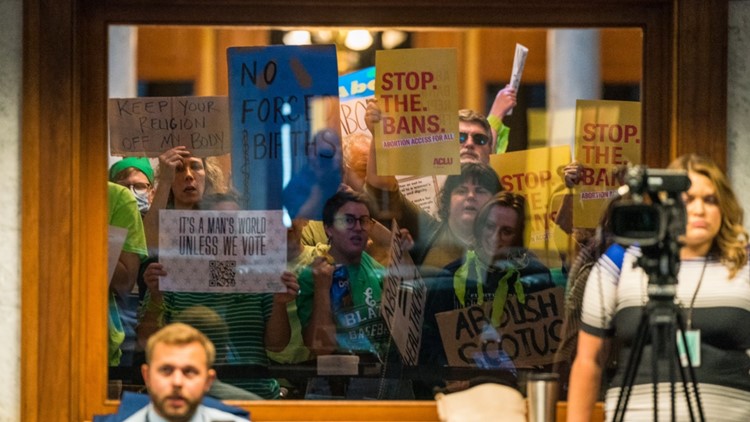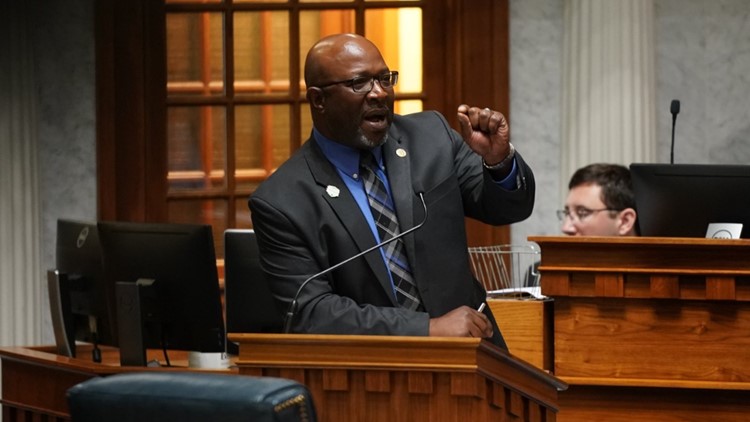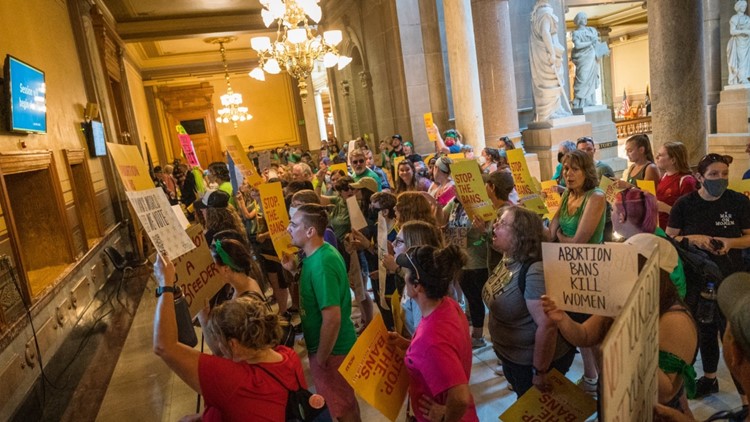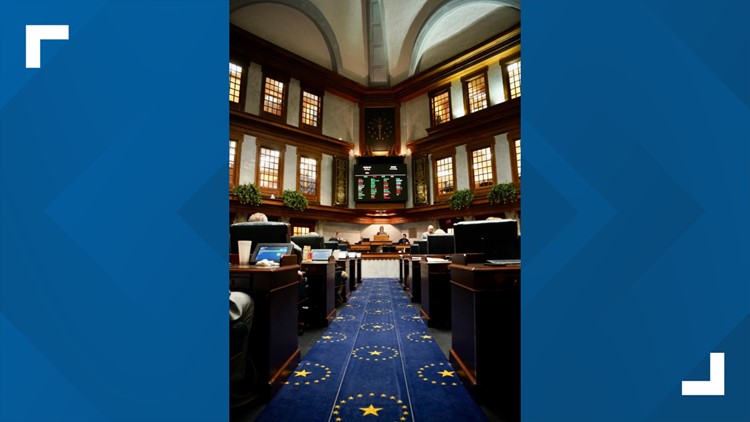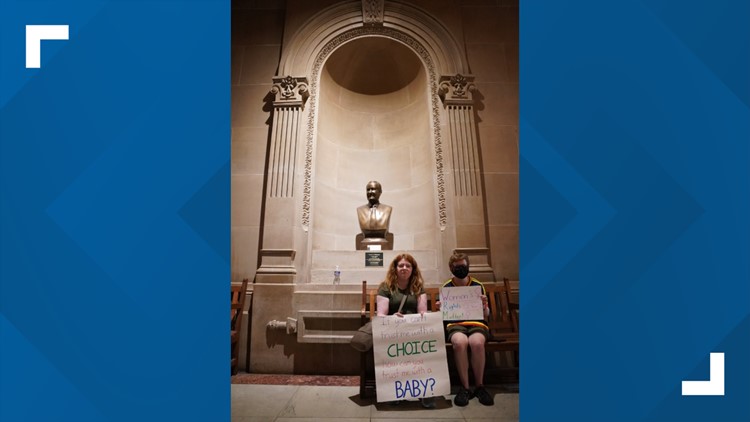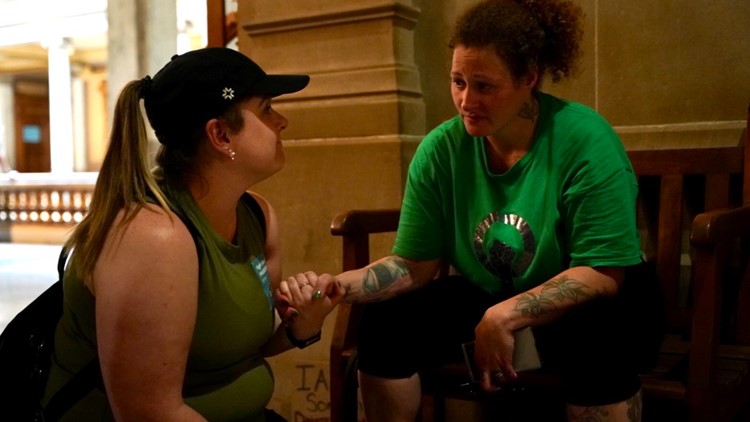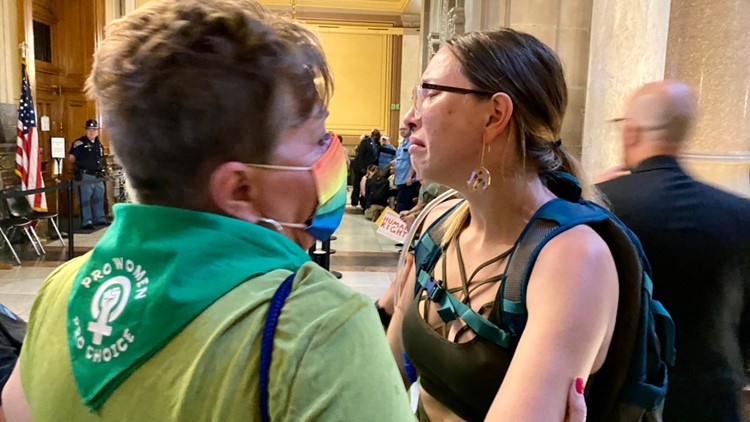INDIANAPOLIS — Indiana on Friday became the first state in the nation to approve abortion restrictions since the U.S. Supreme Court overturned Roe v. Wade, as Governor Eric Holcomb quickly signed legislation creating a near-total ban on the procedure shortly after lawmakers approved it.
The ban, which takes effect Sept. 15, includes some exceptions. Abortions would be permitted in cases of rape and incest, before 10-weeks post-fertilization; to protect the life and physical health of the mother; and if a fetus is diagnosed with a lethal anomaly. Victims of rape and incest would not be required to sign a notarized affidavit attesting to an attack, as had once been proposed.
(NOTE: Live blog below, including statements from Indiana health care providers after the legislation was signed into law.)
Under the bill, abortions can be performed only in hospitals or outpatient centers owned by hospitals, meaning all abortion clinics would lose their licenses. A doctor who performs an illegal abortion or fails to file required reports must also lose their medical license — wording that tightens current Indiana law that says a doctor “may” lose their license.
"I am personally most proud of each Hoosier who came forward to courageously share their views in a debate that is unlikely to cease any time soon,” Holcomb said in the statement announcing that he had signed the measure. “For my part as your governor, I will continue to keep an open ear.”
His approval came after the Senate approved the ban 28-19 and the House advanced it 62-38.
Indiana was among the earliest Republican-run state legislatures to debate tighter abortion laws after the Supreme Court ruling in June that removed constitutional protections for the procedure. But it is the first state to pass a ban through both chambers, after West Virginia lawmakers on July 29 passed up the chance to be that state.
“Happy to be completed with this, one of the more challenging things that we’ve ever done as a state General Assembly, at least certainly while I’ve been here,” Senate President Pro-Tem Rodric Bray told reporters after the vote. “ I think this is a huge opportunity, and we’ll build on that as we go forward from here.”
Sen. Sue Glick of LaGrange, who sponsored the bill, said that she does not think “all states will come down at the same place” but that most Indiana residents support aspects of the bill.
Some senators in both parties lamented the bill's provisions and the impact it would have on the state, including low-income women and the health care system. Eight Republicans joined all 11 Democrats in voting against the bill, though their reasons to thwart the measure were mixed.
“We are backsliding on democracy,” said Democratic Sen. Jean Breaux of Indianapolis, who wore a green ribbon Friday signifying support for abortion rights, on her lapel. “What other freedoms, what other liberties are on the chopping block, waiting to be stripped away?”
Republican Sen. Mike Bohacek of Michiana Shores spoke about his 21-year-old-daughter, who has Down syndrome. Bohacek voted against the bill, saying it does not have adequate protections for women with disabilities who are raped.
“If she lost her favorite stuffed animal, she’d be inconsolable. Imagine making her carry a child to term,” he said before he started to choke up, then threw his notes on his seat and exited the chamber.
Republican Sen. Mike Young of Indianapolis, however, said the bill’s enforcement provisions against doctors are not stringent enough.
Such debates demonstrated Indiana residents' own divisions on the issue, displayed in hours of testimony lawmakers heard over the past two weeks. Residents rarely, if ever, expressed support for the the legislation in their testimony, as abortion-rights supporters said the bill goes too far while anti-abortion activists expressed it doesn’t go far enough.
The debates came amid an evolving landscape of abortion politics across the country as Republicans face some party divisions and Democrats see a possible election-year boost.
Republican Rep. Wendy McNamara of Evansville, who sponsored the House bill, told reporters after the House vote that the legislation “makes Indiana one of the most pro-life states in the nation."
Outside the chambers, abortion-rights activists often chanted over lawmakers' remarks, carrying signs like “Roe roe roe your vote” and “Build this wall” between church and state. Some House Democrats wore blazers over pink “Bans Off Our Bodies” T-shirts.
Indiana's ban followed the political firestorm over a 10-year-old rape victim who traveled to the state from neighboring Ohio to end her pregnancy. The case gained attention when an Indianapolis doctor said the child came to Indiana because of Ohio’s “fetal heartbeat” ban.
Religion was a persistent theme during legislative debates, both in residents’ testimony and lawmakers' comments.
In advocating against the House bill, Rep. Ann Vermilion condemned fellow Republicans who have called women “murderers” for getting an abortion.
“I think that the Lord’s promise is for grace and kindness,” she said. “He would not be jumping to condemn these women.”
Holcomb signs relief bill alongside abortion ban
Gov. Holcomb also signed a relief bill Friday night that will provide $200 rebate payments from the state’s surging budget surplus.
Though below his initially proposed $225 refunds, Republican Gov. Eric Holcomb said the measure “fulfills what I set out to accomplish when calling the General Assembly into special session” and establishes “long overdue increased funding” for families and young children.
The bill, which passed earlier that day 37-9, represented a concession from GOP senators who were initially wary that the rebates would further fuel inflation.
That compromise includes utilizing about $1 billion from the state’s record $6.1 billion in cash reserves for the rebates. Another approximately $1 billion will flow toward a state teacher pension fund’s future obligations, a debt Senate Republican leaders have prioritized paying.
Timeline of events
Saturday, Aug. 6
12 p.m. - The White House issued a strong statement in opposition to Indiana's abortion law, calling it "radical" and urging Congress to act by passing a national law to attempt to override Indiana's new law. White House Press Secretary Karine Jean-Pierre posted the Biden administration's statement on the White House website:
"The Indiana legislature took a devastating step as a result of the Supreme Court’s extreme decision to overturn Roe v. Wade and eliminate women’s constitutionally-protected right to abortion. And, it’s another radical step by Republican legislators to take away women’s reproductive rights and freedom, and put personal health care decisions in the hands of politicians rather than women and their doctors.
Yesterday’s vote, which institutes a near-total abortion ban in Indiana, should be a signal to Americans across the country to make their voices heard. Congress should also act immediately to pass a law restoring the protections of Roe – the only way to secure a woman’s right to choose nationally.
Until then, President Biden is committed to taking action to protect women’s reproductive rights and freedom, and access to care they are afforded under Federal law."
8:30 a.m. - IU Health shared a statement following the passage and signing of SB 1:
"At IU Health, we take seriously our responsibility to provide access to compassionate and safe, high-quality healthcare for anyone who needs it. IU Health’s priority remains ensuring our physicians and patients have clarity when making decisions about pregnancy within the limits of the law. We will take the next few weeks to fully understand the terms of the new law and how to incorporate the changes into our medical practice to protect our providers and care for the people seeking reproductive healthcare."
8 a.m. - Eli Lilly's corporate communications office shared the drug maker's statement in reaction to the passage and signing of SB 1 Saturday morning:
“Lilly recognizes that abortion is a divisive and deeply personal issue with no clear consensus among the citizens of Indiana. Despite this lack of agreement, Indiana has opted to quickly adopt one of the most restrictive anti-abortion laws in the United States. We are concerned that this law will hinder Lilly’s – and Indiana’s - ability to attract diverse scientific, engineering and business talent from around the world. While we have expanded our employee health plan coverage to include travel for reproductive services unavailable locally, that may not be enough for some current and potential employees.
As a global company headquartered in Indianapolis for more than 145 years, we work hard to retain and attract thousands of people who are important drivers of our state’s economy. Given this new law, we will be forced to plan for more employment growth outside our home state.”
Friday, Aug. 5
11:30 p.m. - State senators reacted to the bill's passage after Friday's vote.
"These kinds of decisions are never made in a vacuum and there are polls going each way, but actually the insistence here is we protect as many people as possible," said Sen. Sue Glick, R-District 13. "The state of Indiana has the ability to go forward and adopt programs and become invovled in these issues to the extent that we can help these women deliver and deliver safely and to take care of these babies as they come along."
"If you're pro-life, you can't be happy. If you're pro-choice, you can't be happy. I don't know who left here happy. All I know is people need to go out and vote in November," said Sen. Greg Taylor, D-District 13.
11:15 p.m. - Gov. Eric Holcomb said he has signed Senate Bill 1 and Senate Bill 2 into law.
"Following the overturning of Roe, I stated clearly that I would be willing to support legislation that made progress in protecting life. In my view, SEA 1 accomplishes this goal following its passage in both chambers of the Indiana General Assembly with a solid majority of support," Holcomb said in a statement after signing the legislation. "These actions followed long days of hearings filled with sobering and personal testimony from citizens and elected representatives on this emotional and complex topic. Ultimately, those voices shaped and informed the final contents of the legislation and its carefully negotiated exceptions to address some of the unthinkable circumstances a woman or unborn child might face."
After dozens of Indiana residents took the opportunity to speak in front of the Legislature, sharing their personal beliefs about abortion, the governor encouraged Hoosiers to continue to reach out to their elected officials to make their opinions known.
"Looking back, I am personally most proud of each Hoosier who came forward to courageously share their views in a debate that is unlikely to cease any time soon. For my part as your governor, I will continue to keep an open ear," Holcomb said.
Read the governor's full statement here.
9:58 p.m. - The Senate passed the abortion ban bill with a 28-19 vote.
The bill now heads to Holcomb's desk for his signature before it becomes law.
6:40 p.m. - The Senate is taking up the abortion ban bill. Republicans are expected to pass the House-amended bill and send it to the governor's desk.
4:00 p.m. - The Senate is in recess until around 6:30 p.m. when it is expected to reconvene to tackle the abortion ban bill.
3:55 p.m. - The Senate approved the $200 tax refund bill after the House passed it earlier Friday. The measure now heads to Gov. Eric Holcomb's desk.
3:04 p.m. - The Senate filed a motion to concur on SB 1, which means the Senate will accept the amended House abortion ban version as is.
3:00 p.m. - The Senate is taking up the amended SB 2, which includes the $200 tax refund for Hoosiers taxpayers.
2:25 p.m. - In 4 hours, the Senate will be able to take up the abortion ban bill if lawmakers so choose.
2:24 p.m. - The Indiana House has passed a bill that would ban nearly all abortions in the state, sending the legislation back to the state Senate to confer on House changes. House members on Friday advanced the near-total abortion ban 62-38 with limited exceptions, including in cases of rape and incest, and to protect the life and physical health of the mother. The measure now goes to the Senate. If approved as is, Indiana lawmakers will become the first in the nation to pass new legislation restricting access to abortions since the U.S. Supreme Court’s ruling in June removing its protected status as a constitutional right. The measure then would go to Gov. Eric Holcomb, who has not indicated whether he would sign it.
2:20 p.m. - Democrats made a motion to suspend action on the abortion ban and it failed.
1:45 p.m. - The Senate convened to have a final reading on SB 2, which would give a $200 tax refund to Hoosier taxpayers.
1:30 p.m. - There has been emotional testimony from both sides of the aisle as lawmakers debate the abortion ban bill.
12:25 p.m. - The debate over the abortion ban bill has passed 2 hours.
12:20 p.m. - Rep. Renee Pack says she is standing against further oppression of girls & women in the state of Indiana. Says beliefs of Republican representatives should not be put on the women of Indiana. Passionately objects to being called a murderer by colleagues.
11:30 a.m. - Some Republicans continue criticism of the GOP bill saying it does not go far enough. Rep. Matt Hostettler is urging his fellow Republicans to come back in the next session and strengthen the ban.
10:40 a.m. - Democrats strongly voiced their opposition to the abortion ban. Among their remarks: "Sadly women will lose," "Don't pretend the abortion ban will not kill women," "Health care providers and doctors will flee our state."
10:35 a.m. - The House is now debating SB 1, the abortion ban bill.
10:14 a.m. - The House passed SB 2 for inflation relief 93-6.
The version passed Friday morning would make Indiana taxpayers eligible for $200 rebate payments from the state’s surging budget surplus under an apparent deal reached among Republican legislators. The measure overwhelmingly passed the House on Friday morning and GOP Senators have already signaled they will pass it.
Those payments will be less than the $225 refunds that were originally proposed by Republican Gov. Eric Holcomb but the deal represents a concession from GOP senators who were reluctant to go along with that plan.
10:10 a.m. - Rep. James DeLaney (D) likened the current inflation relief proposal to an empty pinata or a cookie jar filled with store bought wafers. He said from the House floor that the surplus could potentially provide six times more relief to Hoosiers than what Republican leaders proposed.
9:46 a.m. - The House is starting with SB 2 (tax refund plan). Sponsor Rep. Tim Brown said the Senate supports the compromise package being considered. Rep. Greg Porter (D) said it is a missed opportunity to do more for Hoosiers.
9:45 a.m. - The House is reconvening for votes on SB 1 and SB 2.
Wednesday, Aug. 3
6:43 p.m. - The house has adjourned for the day.
5:45 p.m. - Amendment 3 would allow State Department of Health to look at each county to see how they can offer free and affordable birth control and education. The amendment passed.
5:30 p.m. - House is discussing SB 2 now dealing with the tax refund plan. There’s an amendment being discussed that would give the first billion in excess to teacher retirement fund, the remaining reserves would go to an automatic taxpayer refund for calendar year 2023. The amendment passed.
5:27 p.m. - Taxpayers would now get a $200 refund instead of $225.
5:25 p.m. - The abortion ban bill was amended to not take effect until Sept. 15. The bill passed second reading and will get a third reading on Friday.
5:20 p.m. - An amendment to create an expert panel that would vet complaints regarding abortions performed to see if violation occurred failed.
2:50 p.m. - An amendment to remove the exception for fatal fetal anomalies failed.
2:24 p.m. - A Democrat Amendment to add the abortion issue to the November ballot failed.
2:03 p.m. - After a contentious debate on Amendment 20 to remove the rape and incest exceptions. The motion failed with a vote of 39 to 61. The majority of the 71 Republicans in the House voted to remove the exceptions.
1:50 p.m. - An amendment changing language to define an abortion exemption in cases of serious medical risk was approved.
1:33 p.m. - The House is considering amendments to the abortion ban bill.
12:30 p.m. - The Senate Tax and Fiscal Police committee passed an amended version of HB1001 with a 10-1 vote. In committee, the bill was stripped and now reads like SB2 (funding to support women) and SB3 (inflationary relief). This comes after the House stripped SB2, to make it read like HB1001.
Tuesday, Aug. 2
6:10 p.m. - The amended version of Senate Bill 1 passed out of the House Courts and Criminal Code committee by a vote of 8-5. The bill now heads to the full House for consideration.
11:25 a.m. - The Indiana House Ways & Means committee unanimously passed, amended and stripped Senate Bill 2 on to the full House of Representatives. The bill now includes all of the language from House Bill 1001, which focused on the $225 taxpayer refund.
They also stripped out the Hoosier Families First Fund, which would provide $45 million for eligible existing and new programs to address:
- Funding to support the health of pregnant mothers
- Maternal support services and pregnancy resource centers
- Access to contraception
- Pregnancy planning, including removing barriers to long-acting reversible contraception
- Needs of low-income families with children under 4 years old
- Increased access to child care
- Support for foster and adoptive care
- Programs to prevent children from entering the DCS system
- Funding for Safe Haven Baby Boxes and more.
9:43 a.m. - Public testimony on the bill has begun.
9:43 a.m. - Author of SB1 Sen. Sue Glick is speaking about the bill.
9:30 a.m. - The Indiana House Ways & Means committee has amended Senate Bill 2 and stripped language to essentially read like House Bill 1001, giving Hoosier taxpayers a $225 refund and providing additional adoption services. The $45 million Hoosier Families First Fund is gone from the bill.
9:26 a.m. - The committee passed Amendment 25. It proposes several changes to SB1 including removing some restrictions for victims of rape and incest.
9:05 a.m. - The House Courts and Criminal Code committee is meeting to discuss amendments to Senate Bill 1 before sending it to the full House of Representatives. Public testimony will also take place Tuesday. The full House is expected to meet at 5:30 p.m. Tuesday.
Monday, Aug. 1
8:30 p.m. - The Indianapolis Jewish Community Relations Council is condemning some comments made by Sen. Michael Young during the Senate debate surrounding the abortion ban, and they're calling on him to apologize.
They issued a statement today saying his remarks on the floor appeared to equate Judaism's views on reproductive rights with condoning murder.
The statement goes on to say, "Judaism views the preservation of life as paramount; while a fetus has the potential for life, such potential never supersedes the life of the pregnant woman."
1:45 p.m. - The House adjourned until Tuesday evening.
1:30 p.m. - The House is taking on Senate Bill 1, the abortion ban bill, and sending it to committee. House Courts and Criminal Code will first look at and amend the bill before sending it to the full House.
Saturday, July 31
5 p.m. - IU Health issued the following statement in response to SB1 passing:
"As the largest healthcare provider and only academic health center in the state, IU Health’s priority remains to ensure our physicians and patients have clarity when making decisions about pregnancy, including the ability to address not only life-saving interventions, but also to intercede when a pregnant woman’s health is at risk and to make sure our providers are not criminalized when doing so.
The bill’s restrictions on a physician’s ability to do what is medically proven and appropriate for the health and life of a pregnant patient, plus the threat of criminalization, impact our ability to provide safe and effective patient care and could deter physicians seeking to live and practice healthcare in Indiana."
4:45 p.m. - Three Indiana senators did not vote on Saturday's abortion ban bill. A spokesperson for Sen. Lonnie Randolph (D - District 2) shared the following statement with 13News:
"Unfortunately, Sen. Randolph could not be at the Statehouse due to a family emergency. Just for the record: the Senator does not support banning abortion and opposes Senate Bill 1."
Senators Jack E. Sandlin (R - District 36) and Phil Boots (R - District 23) also did not vote Saturday. 13News have reached out for an explanation but has not heard back at this time. Sandlin not voting for Senate Bill 1. Senator Boots not voting for Senate Bill 1.
4 p.m. - The Senate passed the inflation relief bill 40-4, focusing on taxes but not another refund for taxpayers. The bill now heads to the House for its approval.
2:44 p.m. - The Senate passed the abortion ban bill 26-20. The bill now heads to the House for its approval.
GALLERY: Protesters chant, cry, console as senators pass abortion ban bill
Friday, July 29
3:05 p.m. - Late last night, Republican senators voted to sidestep the authority of county prosecutors in order to enforce a new abortion law.
If passed, the abortion bill would allow a special prosecutor or the state attorney general to prosecute doctors and other people who violate the abortion ban “if the prosecuting attorney is categorically refusing to enforce the law.”
Marion County Prosecutor Ryan Mears has already said his office will not file charges against doctors or pregnant mothers for violating the Senate’s proposed abortion ban.
"The Marion County Prosecutor’s office is a creation of the Indiana constitution. This is a statute that we’re trying to restrict the authority of a constitutionally elected office holder and so there’s going to be legal challenges to this," Mears said. "So a bill that’s already going to have to work its way through the legal process, they’ve just added another issue that’s going to have to be litigated and it’ll be an issue that is ultimately decided in the courts."
2:50 p.m. - The House passed Bill 1001, which would give Hoosier taxpayers a $225 refund.
1:10 p.m. - The Senate is in recess until Saturday at 11 a.m. to take up Senate Bill 1, which is the abortion ban.
1:07 p.m. - Senate Bill 2 passes with near unanimous support.
10:50 a.m. - Senators have started with a second reading on Senate Bill 3 (helping Hoosiers with inflation) and a third reading of Senate Bill 2 (resources for women and children)
12:17 a.m. - Senators will return on Saturday for more discussion on Senate Bill 1, since Thursday's debate went past midnight. The lawmakers will have a second reading on Senate Bill 3 (helping Hoosiers with inflation) and a third reading of Senate Bill 2 (resources for women and children) on Friday.
A final vote on SB1 is expected on Saturday.
Thursday, July 28
9:42 p.m. - Amendment to eliminate rape and incest exceptions fails.
7:10 p.m. - Amendment to remove taxes from the sale of feminine products, like tampons and pads, fails.
5:03 p.m. - The session has begun.
4:40 p.m. - Delayed until 5 p.m.
4:25 p.m. - 4:45 p.m. start time set.
4:13 p.m. - And...4:30 p.m. now.
3:50 p.m. - And now the start time is 4:15 p.m.
3:35 p.m. - The start was pushed back to 3:55 p.m.
3:05 p.m. - The start of today's session was pushed back again. Discussion on the abortion ban bill and amendments will now start at 3:45 p.m.
1 p.m. - In the 24 hours since the Senate received the abortion ban bill from the committee, 62 amendments have been filed ranging from penalties to access to contraception and other restrictions. The Senate will start considering the amendments at 3:30 p.m.
11:45 a.m. - Senate Democrats will be offering more than 30 amendments to Senate Bill 1.
11:30 a.m. - Senate Democrats are sharing their proposed amendments to the abortion bill.
Wednesday, July 27
1:58 p.m. - The Senate adjourns.
1:45 p.m. - The Senate approves accepting the abortion ban and sets work to begin July 28.
1:34 p.m. - The full Senate convenes to receive the abortion ban bill from committee.
Tuesday, July 26
8:30 p.m. - On Tuesday, Indiana Right To Life held an anti-abortion rally at the statehouse.
12:50 p.m. - Sen. Taylor said that if life begins at conception, then so should all other benefits. It failed 4 to 8.
12:45 p.m. - Senate Bill 1 passed out of the Senate committee with a vote of 7-5. One GOP member voted no and two other Republicans said they didn't like the bill but voted "yes." The bill will now go to the full Senate for possible amendments.
12:40 p.m. - Sen. Bray will not allow consideration of other amendments.
12:18 p.m. - Senators are discussing a measure that would require rape and incest victims to sign an affidavit under penalty of perjury. It passed 7-5.
11:59 a.m. - Amendment 5 which would allow pregnant people to utilize telehealth to access abortions. It failed 7-8.
11:45 a.m. - Democrats are questioning who authored amendment 2, which would require people 16 or older, who are raped or victim of incest, 8 weeks to get an abortion. Someone younger than that has 12 weeks to get an abortion.
11:32 a.m. - Public testimony has ended.
11:21 a.m. - 17 amendments have been proposed so far. They can be seen here. The amendments add stiffer penalties to those that would illegally perform an abortion, protections for contraceptive measures, religious exemptions, and that a woman would need to sign an affidavit attesting to rape or incest before an abortion and that would be added to their permanent health record.
11:08 a.m. - A man testified abortion also affects fathers.
11:02 a.m. - A speaker tells lawmakers the decision to have an abortion saved her life.
10:36 a.m. - Senate Republicans ask a conservative speaker if passing some abortion restrictions is at least better than nothing. The speaker had criticized the measure as not going far enough.
10:19 a.m. - On Monday, Democrats asked questions of those testifying. On Tuesday, Republican Sen. Eric Bassler started to ask some questions.
10:18 a.m. - Anti-abortion advocates are gathering for an 11 a.m. protest.
10:02 a.m. - A woman who chose to have an abortion when she was younger is testifying.
9:49 a.m. - Some critics of the bill feel it does not go far enough with penalties for those who would perform an abortion.
9:31 a.m. - Public testimony begins.
9:29 a.m. - At this point, 91 people showed up to testify. More than 300 had signed up.
9 a.m. - Public testimony from people on both sides of the abortion debate are speaking in front of the Senate committee.
Monday, July 25
5 p.m. - Today's special session was met with protesters on both sides of the abortion debate.
Some of the protesters stood side by side, sharing space and opposing views in the statehouse.
4:15 p.m. - National Right to Life joins Indiana Right to Life in opposing SB 1.
“Indiana’s SB 1 is a complete disaster of a bill,” said Carol Tobias, president of National Right to Life. “It would fail, in a spectacular way, to protect any human lives and instead would leave women vulnerable to an industry that preys upon women.”
It makes the following claims:
- SB 1 removes all criminal penalties from, and provides complete immunity for, illegal abortions consented to by pregnant women, except for partial-birth abortions, D & E abortions, and abortions performed without informed consent.
- SB 1 does not require the consent of a woman for an abortion to save the life of the mother. Thus, the physician can abort the child even if the mother objects and wants to carry the baby.
- SB 1 explicitly recognizes, legalizes, and facilitates chemical abortion clinics throughout Indiana by authorizing abortion-inducing drugs to flood the state. The bill facilitates their use through the licensing of current and future chemical abortion clinics throughout the state.
3:31 p.m. - Nearly all of those testifying are against the bill.
2:55 p.m. - Protestors chants outside in the Statehouse can be heard inside the committee chamber.
2:52 p.m. - A local rabbi says this legislation is based on Christian beliefs, but it doesn't take other faiths into consideration.
2:29 p.m. - Every person that has testified so far in the committee public testimony has opposed the bill.
2:18 p.m. - Teens have testified on the Senate bill saying it does not go far enough.
2:13 p.m. - Protestors on both side of the issue stand side-by-side at the statehouse.
1:20 p.m. - Protestors are now gathering outside of where VP Harris met with lawmakers.
1:15 p.m. - Sen. Glick is taking questions about the abortion ban bill she authored.
1:08 p.m. - People wanting to speak as part of the public testimony will have three minutes.
1:00 p.m. - A Senate committee begins discussion on the abortion ban bill and hearing public testimony.
12:52 p.m. - Protestors are marching around the Statehouse.
12:46 p.m. - We are just about 15 minutes from the start of the Senate committee hearing on the abortion ban bill.
12:42 p.m. - North Capitol Avenue is blocked at the Statehouse as protestors spill into the street.
12:12 p.m. - People are lining up to speak during public testimony in the Senate committee.
12:03 p.m. - People protesting the abortion ban bill are holding a rally inside the Statehouse.
11:45 a.m. - Vice President Kamala Harris meets with Democrat lawmakers to discuss reproductive right.
"An individual should be able to choose based on their personal beliefs and the dictates of their faith. But the government should not be telling an individual what to do, especially as it relates to one of the most intimate and personal decisions a woman could make," Harris said.
11:00 a.m. - Senators introduced the bills and then sent them to committee. Public testimony will be heard on the bills in the committee session Monday afternoon.
Senate work on abortion ban
On July 20, Senate Republicans released details on the abortion ban bills it would be presenting. Senate Bill 1 outlines restrictions, while Senate Bill 2 details $50 million in support programs that will be offered to women and girls, mothers and families.
Senate Bill 1 immediately received criticism from both parties and from members in the Senate and the House. Some Republicans called for a complete ban in all cases and vowed to not support anything short of that. Right to Life was critical of the bill for not having more in it covering enforcement. Democrats were critical of the bill going too far and restricting a woman being able to choose what happens with her body.
Some did praise Senate Bill 1 and 2 as measures that found a more middle ground on exceptions, support and education.
Senate Bill 1: Abortion
Senate Bill 1 would greatly limit abortions and where they can be done.
If the abortion is necessary to prevent a "substantial permanent impairment of the life of the mother," the bill's summary says.
If the pregnancy was the result of rape or incest
The bill would also make it illegal for clinics that currently provide abortion care to continue providing that care.
Senate Assistant President Pro Tempore Sue Glick, R-LaGrange, said this bill "does not criminalize women seeking an abortion."
The bill's language says it would provide a defense for any pregnant mother who's criminally charged for having or trying to have an abortion. It also specifies that doctors who provide abortions can only be charged with certain crimes.
Other notes
There is a list of things Republicans said this bill does not do, including:
- Does not affect access to the morning-after pill or any other method of birth control
- Does not affect treatment of miscarriages
- Does not affect treatment of ectopic pregnancies
- Does not affect in-vitro fertilization procedures
- Does not prohibit ending a pregnancy when the unborn child would not be able to survive due to a fatal fetal anomaly
- Does not criminalize women seeking an abortion
- Does not create any new penalties for doctors who perform abortions – the existing penalty that allows a doctor to have his or her license revoked if he or she performs an illegal abortion will remain in place.
Senate Bill 2: Resources for women, children
Senate Bill 2 will create the Hoosier Families First Fund, which would provide $45 million for eligible existing and new programs to address:
- Funding to support the health of pregnant mothers
- Maternal support services and pregnancy resource centers
- Access to contraception
- Pregnancy planning, including removing barriers to long-acting reversible contraception
- Needs of low-income families with children under 4 years old
- Increased access to child care
- Support for foster and adoptive care
- Programs to prevent children from entering the DCS system
- Funding for Safe Haven Baby Boxes and more.
Other notes
Senate Bill 2 would also include $5 million to help increase the adoption credit from $1,000 to $10,000.
What Indiana House bills could look like
House Speaker Todd Huston, R-Fishers, released the following statement with some details on what the House version of the abortion bill would look like. He does not include to what extent the ban would be and if there would be exceptions. Instead, his remarks were more inline with proposals in Senate Bill 2.
"Our proposal includes more than $20 million in tax exemptions and appropriates more than $58 million to boost proven programs, including helping more mothers in crisis, increasing availability and affordability of child care, supporting community-based programs focused on healthy babies and families, and encouraging more people to consider adoption. We look forward to working with our Senate colleagues and the governor in the days and weeks ahead, and I'm confident we'll find a thoughtful way forward that shows compassion for both mothers and babies."
Senate Bill 3: Helping Hoosiers with inflation
Senate Republicans also detailed Senate Bill 3 to help Hoosiers with inflation. They are proposing a few breaks for Hoosiers instead of a tax refund. Those breaks include the following:
- A six-month reprieve on the 7% sales tax on all residential utility bills
- No further increase in gas taxes; it cannot go above 29.5 cents/gallon through June 30, 2023
- Suspends the increase to the gas tax and special fuel tax that took effect on July 1, effective through June 30, 2023. This policy will reduce the gas tax by 1 cent per gallon and the special fuel tax by 2 cents per gallon.
Additional surplus money, $400 million worth, will be used to pay down the teachers' pension fund.
Around $215 million would be used to fund capital projects that are outpaced by inflation-related construction costs.
The senators said the suspension of sales tax on utilities and capping the gas tax is a better way to help Hoosiers than a $225 additional refund check proposed by Holcomb.
House opposition
House Speaker Todd Huston, R-Fishers, rejected Senate Bill 3. He is pushing for the $225 tax refund to Hoosiers. In a statement he said: “Hoosiers need help now and Indiana is in a position to give them back their money."
To see the proposed House measure for a tax refund, click here.
Anticipated Senate schedule
Monday, July 25
11 a.m.: The Senate will convene session at 11 a.m. to introduce Senate bills for their first reading. This is procedural — debate on bills does not typically occur at this stage.
1 – 5 p.m.: The Senate Committee on Rules and Legislative Procedure will meet in the Senate Chamber to hear Senate Bill 1. If all those present who signed up have testified before 5 p.m., the committee will adjourn at that time.
Members of the public who wish to testify should sign up prior to the start of the committee, which can be done online or in person, and must check in outside the Senate Chamber.
The committee is expected to end by 5 p.m. A vote will not be taken Monday.
Tuesday, July 26
9 a.m. – noon: The Senate Committee on Rules and Legislative Procedure will meet in the Senate Chamber to continue hearing testimony on Senate Bill 1. The committee is expected to vote on Senate Bill 1 at the end of the meeting. If all those present who signed up have testified before noon, the committee will move to discussion and consideration of the bill at that time.
Members of the public who wish to testify should sign up prior to the start of the committee, which can be done online or in person, and must check in outside the Senate Chamber.
2 – 5 p.m.: The Senate Committee on Appropriations will convene in the Senate Chamber of the Statehouse to hear Senate Bill 2 and Senate Bill 3.
Members of the public who wish to testify should sign up prior to the start of the committee, which can be done online or in person, and must check in outside the Senate Chamber.
Wednesday, July 27
1:30 p.m.: The Senate will convene for session to adopt committee reports. This is procedural — debate on bills does not typically occur at this stage.
Thursday, July 28
1:30 p.m.: The Senate will convene for session for Senate bill(s) on second reading. At this stage, senators may offer, debate and vote on amendments to bills. Filed amendments will be available for review at iga.in.gov.
Friday, July 29
10:30 a.m.: The Senate will convene for Senate bill(s) on third reading. Debate on those bills will occur at this stage, and a final vote is expected to be taken on them.
Anticipated House schedule
Monday, July 25
10 a.m.: House Session
Tuesday, July 26
10 a.m.: House Session
11 a.m.: Ways & Means – House Bill 1001(ss) – (Testimony, Amend and Vote)
Session will reconvene upon adjournment of Ways & Means (Committee Report Adoption)
Thursday, July 28
Time TBD: House Session – House Bill 1001(ss) – (2nd Reading)
Friday, July 29
Time TBD: House Session – House Bill 1001(ss) – (3rd Reading)
Week of Aug. 1
House to consider Senate-passed legislation
Those wishing to testify
The Statehouse could be packed Monday with anti-abortion and abortion-rights advocates who will be given their opportunity to speak to lawmakers on the Senate floor.
Indiana Senators have no idea how many people will want to testify on the abortion bill. They have allotted four hours Monday afternoon and three more on Tuesday morning.
The rules of the hearing are up to the committee chair, in this case Sen. Rodric Bray (R), Senate President Pro Tempore. He can set a time limit for each speaker depending on how many people want to testify, but his stated intention is for everyone who signs up to be heard.
Members of the public who wish to testify should sign up prior to the start of the committee.
Signing up to comment publicly can be done online starting Monday, July 25. The link goes live at 12:01 a.m. ET on the days of testimony.
A person can also register in person, and those registered must check in outside the Senate Chamber.

